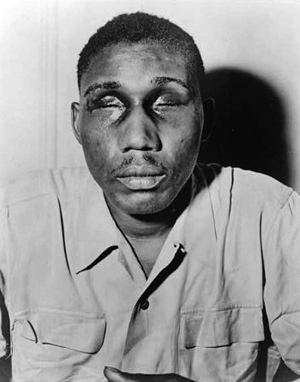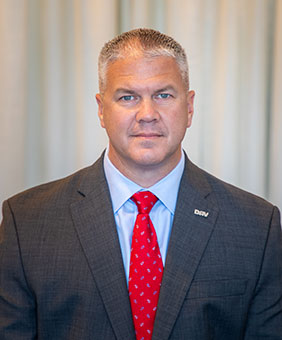
For Black History Month, DAV honors a World War II veteran whose suffering brought attention to the civil rights movement
In February, the town of Batesburg, S.C., will unveil a historical marker detailing a story of horrific, discriminatory violence against an American war veteran for all to see—and feel.
The marker will feature a Braille and engraved print inscription to help tell the story of Army Sgt. Isaac Woodard, the World War II veteran who returned home from the Pacific to be savagely beaten and blinded for life.
“I’m honored to be a part of this celebration of an American hero who never should have come home from war only to suffer and lose his sight at the hands of fellow Americans,” said National 1st Junior Vice Commander Donald Day, who will speak at the dedication.
Just a few hours after being honorably discharged from the Army in February 1946, Woodard—still in his Army uniform—was on a bus heading home to Winnsboro, S.C., where his wife was waiting for him.
When the bus made an unannounced stop, Woodard asked the driver if he had time to use the restroom. The driver didn’t like how Woodard spoke to him, and the two exchanged words. When the bus reached Batesburg, S.C., the driver complained to local police about Woodard.
Police ordered the Army veteran off the bus, and as Woodard tried to explain his side of the story, he was beaten in the face with a nightstick by the town sheriff, Linwood Shull. After Woodard was taken to jail, Shull continued to beat him, repeatedly striking him in the face and pounding his eyes with the end of the nightstick. Woodard was left for the night with no first aid or treatment.
Woodard pleaded guilty to drunk and disorderly charges the next day. He went back to his cell and treated his wounds with hot compresses until a doctor examined him. The doctor advised officials to take him to a veterans hospital nearby, but it was too late and the damage too severe.
Woodard spent two months recovering at the hospital but completely lost his sight. He had survived 15 months of war overseas, only to be beaten, maimed and blinded by a fellow American. Although charged, Shull was found not guilty at trial.
Woodard faced a new life without sight. His wife left him, and he had no hope of a job. As his future appeared bleak, he moved to the Bronx in New York, where his parents resided. His tragedy, however, would not go unnoticed. The story began to gain traction—sparking outrage.
Heavyweight boxing champion Joe Louis learned of Woodard’s plight and began helping. Actor and director Orson Welles produced a national radio show and spent five weeks discussing the injustice done to Woodard. His story was gaining national attention and support. The wheels of justice were turning. In fact, Woodard’s case is considered one of the first steps of the civil rights movement and led President Harry Truman to order the desegregation of the military in 1948.
Woodard passed away in September 1992, but his story did not end there.
In 2015, retired Army Maj. Don North began researching the case in-depth. North is an avid African-American historian and became inspired to ensure the nation knows and remembers Woodard’s tragic story. Working with other researchers and historians, as well as residents of Batesburg, North began creating a documentary about Woodard’s life and how it helped shape the way toward ending racial discrimination.
“I’ve been immersed in history since my ROTC days,” said North. “I knew of people and events, but I realized I didn’t know and understand them. I became passionate about African-American history, and although I heard Sgt. Woodard’s name, I didn’t know about him, so I began to study about him.”
North began to educate others about Woodard and helped restore Woodard’s good name. The city of Batesburg has expunged the charges against him and has also helped North ensure Woodard’s story is told to all who visit the town by placing a South Carolina state historical marker near the place where Woodard was beaten.
The historical marker was funded by donors around the country, including DAV.
“I’m thankful that organizations and individuals helped Sgt. Woodard through his tough times and began to get our society to a place where people are protected from the prejudices of others,” said Day. “I commend Maj. North and his colleagues for the hard work they have put into making sure Sgt. Woodard’s story is never forgotten. I also commend the city of Batesburg for clearing Sgt. Woodard’s record and name, as well as helping to place his historical marker for all to see.”






